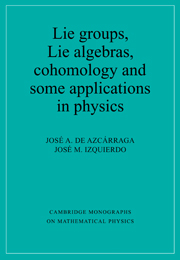Book contents
- Frontmatter
- Contents
- Preface
- 1 Lie groups, fibre bundles and Cartan calculus
- 2 Connections and characteristic classes
- 3 A first look at cohomology of groups and related topics
- 4 An introduction to abstract group extension theory
- 5 Cohomology groups of a group G and extensions by an abelian kernel
- 6 Cohomology of Lie algebras
- 7 Group extensions by non-abelian kernels
- 8 Cohomology and Wess-Zumino terms: an introduction
- 9 Infinite-dimensional Lie groups and algebras
- 10 Gauge anomalies
- List of symbols
- References
- Index
7 - Group extensions by non-abelian kernels
Published online by Cambridge University Press: 08 February 2010
- Frontmatter
- Contents
- Preface
- 1 Lie groups, fibre bundles and Cartan calculus
- 2 Connections and characteristic classes
- 3 A first look at cohomology of groups and related topics
- 4 An introduction to abstract group extension theory
- 5 Cohomology groups of a group G and extensions by an abelian kernel
- 6 Cohomology of Lie algebras
- 7 Group extensions by non-abelian kernels
- 8 Cohomology and Wess-Zumino terms: an introduction
- 9 Infinite-dimensional Lie groups and algebras
- 10 Gauge anomalies
- List of symbols
- References
- Index
Summary
This short chapter contains some results of the theory of extensions by non-abelian groups. It is shown that the study of such extensions can be reduced to an abelian cohomology problem: a G-kernel is extendible iff some three-cocycle with values in the centre of K, Ck, is trivial, and the possible extensions of G by K are in one-to-one correspondence with the extensions of G by the abelian group CK, The obstruction to the extension is given by a three-cocycle.
As a physical example the eight ‘covering’ groups of the complete Lorentz group are found (although this problem does not necessarily require the use of the techniques explained here).
The chapter is intended to provide a more complete description of the problem of group extensions, but may be omitted in a first reading since it is not necessary for the rest of the book.
The information contained in the G-kernel (K,σ)
Let us go back to the general problem of extending an abstract group G (chapter 4) and consider the case where K is not abelian. The main difference from the abelian case of chapter 5 is that not every G-kernel (K,σ) is associated with one or more extensions G of G by K: not every G-kernel (K,σ) is extendible. In fact, one of the aims of this chapter is to show that the G-kernel (K,σ) determines an obstruction to the extension in the form of a certain three-cocycle; the G-kernel (K,σ) is extendible iff this cocycle is trivial.
Before attacking the problem of giving a necessary and sufficient condition for G to exist, let us further analyse the information contained in the data, the G-kernel (K,σ).
- Type
- Chapter
- Information
- Publisher: Cambridge University PressPrint publication year: 1995



